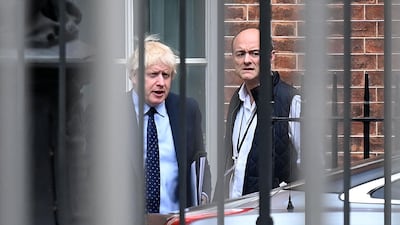Most of us occasionally change our minds. What is much more difficult, generally impossible, is to change our character. Political leaders are no different. They can reverse their policies, change staff and dismiss advisers, but character flaws always get them in the end.
Former US President Bill Clinton was intellectually brilliant and charming, but as the Lewinsky affair proved, his character flaws were ingrained.
Donald Trump’s presidency was the same story, with different flaws. In 2016, some found his characteristic flakiness refreshing, but it became his political epitaph when he encouraged supporters to storm the US Capitol in 2021.
British Prime Minister Boris Johnson, like Donald Trump, appeared to some people refreshingly different. To others he was always shambolic, scruffy in his dress, careless in his public as well as private life and unable to govern by bluster alone. And his character is precisely why this current political crisis in the UK always seemed inevitable. Even if the details are complex, make no mistake: this is indeed a crisis for the Johnson government, despite the fact that Britain's successful vaccination programme has contributed to an enormous reduction in coronavirus cases and deaths.
Mr Johnson's problem is not coronavirus. It's "cronyvirus" – a series of interconnected scandals involving friends and cronies which opposition politicians call "Tory sleaze". Lucrative government contracts and access to top ministers, including the prime minister himself, have gone to Conservative party donors or friends of the government, especially those so-called "cronies" who supported Brexit.
The former Conservative prime minister David Cameron and some senior former officials are embroiled in a separate apparent scandal involving their work on behalf of a finance company with strong government connections.
The finance company has gone bust.
Then there's the British businessman James Dyson, who relocated to Singapore, and was able to contact Boris Johnson personally by text, apparently asking questions about tax. The details of all these matters are at times eye-wateringly complex, and Mr Johnson rebutted some of the charges in his characteristically archaic language, insisting that there is nothing "dodgy or rum or weird or sleazy" going on. Others – including normally supportive commentators and British newspapers – disagree.
The complexity of these stories helps Mr Johnson, but any student of political scandals will tell you that often it is not the big things which trip a leader, but the small ones.
For example, few of us know how much a jet fighter or aircraft carrier should cost, but we have a rough idea of the cost of a toilet seat. In the 1980s in the US during Ronald Reagan’s defence build-up there were numerous stories about the Pentagon wasting billions of dollars on high-tech projects, but what eventually cut through with the American public was the revelation that the Pentagon paid $640 for a lavatory seat and $7,600 for a coffee pot.
A cartoon of the time showed Reagan Secretary of Defence Caspar Weinberger wearing a $640 toilet seat around his neck. The scandal of waste of public funds was obvious.
And so now in Britain we have three stories which everyone can understand. First, Boris Johnson spent £2.6 million on a press room for White House style briefings. You could buy a luxurious house for that, instead of a room like a big cupboard with a couple of flags and a podium.
Some guesses say refurbishment should have cost closer to £20,000 than £2.6 million, and the White House style briefings have been cancelled.
Then, after leaks that Mr Johnson is short of cash and cannot manage on his prime minister’s salary, he and his girlfriend Carrie Symonds refurbished their Downing Street flat allegedly expecting to use political donations to the Conservative party.
And third, a former key adviser, Dominic Cummings, has publicly accused Mr Johnson of behaving in ways which are unethical, foolish and possibly illegal.
Mr Cummings is credited with winning the Brexit vote in 2016 by working brilliantly behind the scenes while Boris Johnson was his frontman and mouthpiece of the campaign. Mr Johnson then took Mr Cummings into a government post, but it was a disaster.
During the coronavirus lockdown, Mr Cummings, while experiencing symptoms of the virus, drove the length of England and claimed – incredibly – some of his driving was to check that his eyesight was fully functional, despite Covid-19.
Mr Johnson stuck with Mr Cummings then, although he did eventually fire him.
Now, amid further briefings and counter-briefings, Mr Cummings appears set on revenge. He knows where the secrets are buried. He had top level access and has retained copies of texts and other sensitive messages. He knows of those times when, to put it politely, Boris Johnson may not have lived up to the highest standards expected of a prime minister.
Mr Cummings says he will be happy to answer any and all questions at a public grilling by members of parliament. Political journalists therefore await a dramatic piece of political theatre that may confirm aspects of the prime minister’s character. And, yes, it is character, always character, which gets them in the end.
Gavin Esler is a broadcaster and UK columnist for The National



